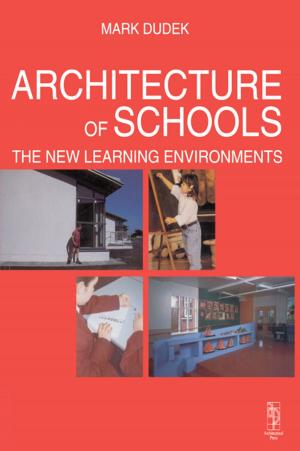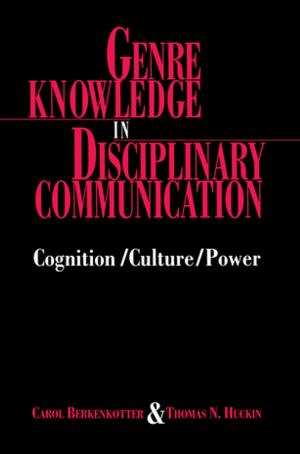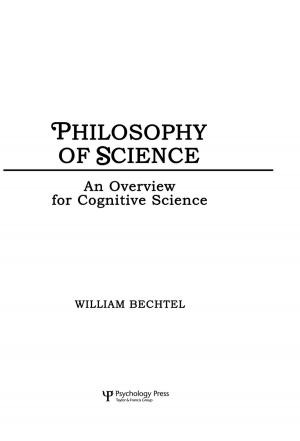Establishing Scientific Classroom Discourse Communities
Multiple Voices of Teaching and Learning Research
Nonfiction, Reference & Language, Language Arts, Communication, Education & Teaching, Teaching, Teaching Methods| Author: | ISBN: | 9781135627980 | |
| Publisher: | Taylor and Francis | Publication: | December 13, 2004 |
| Imprint: | Routledge | Language: | English |
| Author: | |
| ISBN: | 9781135627980 |
| Publisher: | Taylor and Francis |
| Publication: | December 13, 2004 |
| Imprint: | Routledge |
| Language: | English |
Establishing Scientific Classroom Discourse Communities: Multiple Voices of Teaching and Learning Research is designed to encourage discussion of issues surrounding the reform of classroom science discourse among teachers, teacher educators, and researchers. The contributors--some of the top educational researchers, linguists, and science educators in the world--represent a variety of perspectives pertaining to teaching, assessment, research, learning, and reform. As a whole the book explores the variety, complexity, and interconnectivity of issues associated with changing classroom learning communities and transforming science classroom discourse to be more representative of the discourse of scientific communities. The intent is to expand debate among educators regarding what constitutes exemplary scientific speaking, thinking, and acting.
This book is unparalleled in discussing current reform issues from sociolinguistic and sociocultural perspectives. The need for a revised perspective on enduring science teaching and learning issues is established and a theoretical framework and methodology for interpreting the critique of classroom and science discourses is presented. To model and scaffold this ongoing debate, each chapter is followed by a "metalogue" in which the chapter authors and volume editors critique the issues traversed in the chapter by opening up the neatly argued issues. These "metalogues" challenge, extend, and deepen the arguments made.
Central questions addressed include:
*Why is a sociolinguistic interpretation essential in examining science education reform?
*What are key similarities and differences between classroom and scientific communities?
*How can the utility of common knowledge and existing classroom discourse be balanced toward alternative outcomes?
*What curricular issues are associated with transforming classroom talk?
*What other perspectives can assist in creating multiple access to science through redefining classroom discourse?
Whether this volume improves readers' science teaching, assists their research, or helps them to better prepare tomorrow's science teachers, the goal is to engage them in considering the challenges faced by educators as they navigate the seas of reform and strive to improve science education for all.
Establishing Scientific Classroom Discourse Communities: Multiple Voices of Teaching and Learning Research is designed to encourage discussion of issues surrounding the reform of classroom science discourse among teachers, teacher educators, and researchers. The contributors--some of the top educational researchers, linguists, and science educators in the world--represent a variety of perspectives pertaining to teaching, assessment, research, learning, and reform. As a whole the book explores the variety, complexity, and interconnectivity of issues associated with changing classroom learning communities and transforming science classroom discourse to be more representative of the discourse of scientific communities. The intent is to expand debate among educators regarding what constitutes exemplary scientific speaking, thinking, and acting.
This book is unparalleled in discussing current reform issues from sociolinguistic and sociocultural perspectives. The need for a revised perspective on enduring science teaching and learning issues is established and a theoretical framework and methodology for interpreting the critique of classroom and science discourses is presented. To model and scaffold this ongoing debate, each chapter is followed by a "metalogue" in which the chapter authors and volume editors critique the issues traversed in the chapter by opening up the neatly argued issues. These "metalogues" challenge, extend, and deepen the arguments made.
Central questions addressed include:
*Why is a sociolinguistic interpretation essential in examining science education reform?
*What are key similarities and differences between classroom and scientific communities?
*How can the utility of common knowledge and existing classroom discourse be balanced toward alternative outcomes?
*What curricular issues are associated with transforming classroom talk?
*What other perspectives can assist in creating multiple access to science through redefining classroom discourse?
Whether this volume improves readers' science teaching, assists their research, or helps them to better prepare tomorrow's science teachers, the goal is to engage them in considering the challenges faced by educators as they navigate the seas of reform and strive to improve science education for all.















